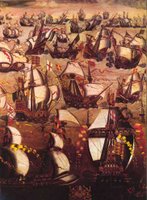Drake's Drum


Sir Francis Darke is best remembered for playing bowls on Plymouth Hoe as the Spanish Armada sailed into England’s western approaches. His drum, less well known, is traditionallybeaten whenever England is threatened by her enemies.
The Drum was heard to beat at Dunkirk as the armada of little ships brought our soldiers home. Much earlier, it was heard when Fairfax and Cromwell came to thank the people of Plymouth for the defense of the town during the long siege of the Civil War.
In November 1918, when the German Navy surrendered, men on board the British Admiral’s flagship heard the long roll of a drum. Afterwards, when neither drum nor drummer could be found, it was by consent said to be “Drake’s Drum!”
Sir Henry Newbolt wrote the poem, ‘Drake’s Drum’, and Peter Dawson, the Australian baritone, the most popular one of the 1920s and 30s, sang the song and recorded it on wax cylinders, which, according to Dawson, needed ‘lungs of leather’ because they recorded only the loudest sounds.
Drake's Drum by Sir Henry Newbolt
DRAKE he's in his hammock an' a thousand mile away,
(Capten, art tha sleepin' there below?)
Slung atween the round shot in Nombre Dios Bay,
An' dreamin' arl the time o' Plymouth Hoe.
Yarnder lumes the island, yarnder lie the ships,
Wi' sailor lads a-dancin' heel-an'-toe,
An' the shore-lights flashin', an' the night-tide dashin'
He sees et arl so plainly as he saw et long ago.
Drake he was a Devon man, an' ruled the Devon seas,
(Capten, art tha sleepin' there below?),
Rovin' tho' his death fell, he went wi' heart at ease,
An' dreamin' arl the time o' Plymouth Hoe,
"Take my drum to England, hang et by the shore,
Strike et when your powder's runnin' low;
If the Dons sight Devon, I'll quit the port o' Heaven,
An' drum them up the Channel as we drummed them long ago."
Drake he's in his hammock till the great Armadas come,
(Capten, art tha sleepin' there below?),
Slung atween the round shot, listenin' for the drum,
An' dreamin' arl the time o' Plymouth Hoe.
Call him on the deep sea, call him up the Sound,
Call him when ye sail to meet the foe;
Where the old trade's plyin' an' the old flag flyin',
They shall find him, ware an' wakin', as they found him long ago.
http://www.bartleby.com/103/41.html
My father, a former matelot in the Royal Navy, often used to sing it while gardening, which is how I come to know it.
Robert L. Fielding

0 Comments:
Post a Comment
Visit My Website<< Home